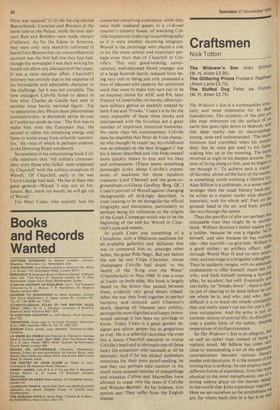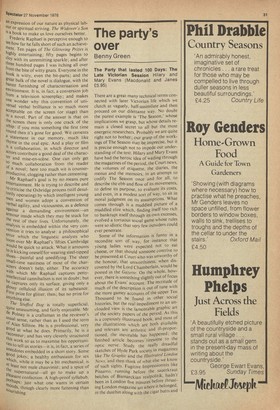Craftsmen
Nick Totton
The Widower's Son Alan Sillitoe (W. H. Allen 0.95)
The Glittering Prizes Frederic Raphael (Allen Lane 0.75)
The Stuffed Dog Peter de PolnaY (W. H. Allen 0.75)
The Widower's Son is a workmanlike structure, and most impressive for its deep foundations. The incidents of the plot are like map references on the surface of an earth that goes right down to bedrock: and this deep reality has its outcroPPings' strong, terse and undramatised. 'The inside horizons had crumbled when his mother died, but he soon got used to his father waking him up in the morning. The earth revolved at night in his deepest dreams. The mist of living clung to him, and he began I° see through it.' To achieve such a matterof-factness, about all the facts of the matter, is something worth working a lifetime far. Alan Sillitoe is a craftsman, in a sense much stronger than the usual literary back-Pat he writes as a master works with phYsical materials, with his whole self. Feet on the ground, head in the air, and body joining the two through the centre. Thus the specifics of plot are perhaps less noticeable than they might be in another book. William Scorton's father makes 110 a soldier, because he was a regular NC'° himself, and also because he has nothing else—like warmth—to give him. William is a good soldier; an artillery officer, right through World War II and on into Peacetime, and marriage to a brigadier's daughter. Then he suddenly resigns, with noadequate explanation to offer himself, much less his wife; and finds himself running a bowlingd alley, by accident, but well. EventuallY inevitably, he "breaks down": there is drastic job of clearing to be done before he can see where he is, and why, and who. Hew difficult it is to reach the simple conclusion that one really wasn't cut out for one's lifetime occupation. And the army is just all extreme version of normal life; its discipline only a public form of the subtle, shaPing imperatives of civilian existence. So The Widower's Son is an allegory, hut as well as rather than instead of being 3 realistic novel. Mr Sillitoe has come verYt close to transcending a lot of the Waren contradictions between various literarY modes and decorums. It is the texture of the writing that is striking: he can employ ma°. different forms of experience, from the Mos` physical to the most metaphysical, out of a strong unitive grasp on the human being" in-the-world that knits experience together' Here we see ourselves as the amphibians vie, are, for whom back-chat in a bar is as rea'
an expression of our nature as physical lab9ur or spiritual striving. The Widower's Son ls a book to make us love ourselves better.
Frederic Raphael is perceptive enough to See how far he falls short of such an achievem.ent. Ten pages of The Glittering Prizes is h,tglilY entertaining; fifty pages begins to Cloy with its unremitting sparkle; and after three hundred pages I was itching all over from the bite of witty gnats. Everyone in the book is witty, even the bit-parts; and the great bulk of the novel is dialogue, with the barest furnishing of characterisation and environment. It is, in fact, a conversion job from a television screenplay; and makes one wonder why this convention of universal verbal brilliance is so much more a. eceptable on the screen (or stage) than In a novel. Part of the answer is that on the screen there is only one crack of the Whip: if you miss something the first time round then it's gone for good. Wit cements `I statement in our memory, much like rbYMe in the oral epic. And a play or film is a collaboration, in which director and actors contribute a good deal of the character and mise-en-scene. One can only get s° much collaboration from the reader of a novel; here too much wit is counterproductive, clogging rather than cementing. Mr Raphael's goal is by no means pure entertainment. He is trying to describe and to criticise the Oxbridge process (still desultOrily operating) by which intelligent young °len and women adopt a convention of verbal agility, and viciousness, as a defence `tgainst a demanding environment—an 4rMour inside which they may be stuck for ihe rest of their lives. Unfortunately, the `thalYsis is embedded within the very convention it tries to analyse: a philosophical eirror which the linguistic analysts who (3°M over Mr Raphael's 'fifties Cambridge viould be quick to attack. What it amounts t° Is kicking oneself for wearing steel-tipped sh°es—painful and unedifying. The sheer sMall-time nastiness of most of the characters doesn't help, either. The accuracy ttb which Mr Raphael captures petty!Ptellectual cannibalism is not in doubt; but tie captures only its surface, giving only a g..,19ssY celluloid illusion of its substance. t:irst prize for glitter, then; but no prize for elnYthing else. The Stuffed Dog is totally superficial, rite unassuming, and fairly enjoyable. Mr Polnay is a craftsman in the reviewer's Ltstlal sense, rather than as I used the term of Alan Sillitoe. He is a professional, very good at what he does. Primarily, he is a triaFonteur; and has very cleverly structured t° Is work so as to maximise his opportuni,les to tell us stories—it is, in fact, a series of (ttlecdotes embedded in a short story. Some g°°d jokes; a healthy enthusiasm for sex h,leb, while it may be a bit mechanical, is :tit, least not male chauvinist; and a spice of `Pe supernatural—all go to make up a Pleasant confection. A high-proof syllabub, ZrhaPS: just what one wants in certain °°ds, though clearly more fattening than Pourishing.











































 Previous page
Previous page